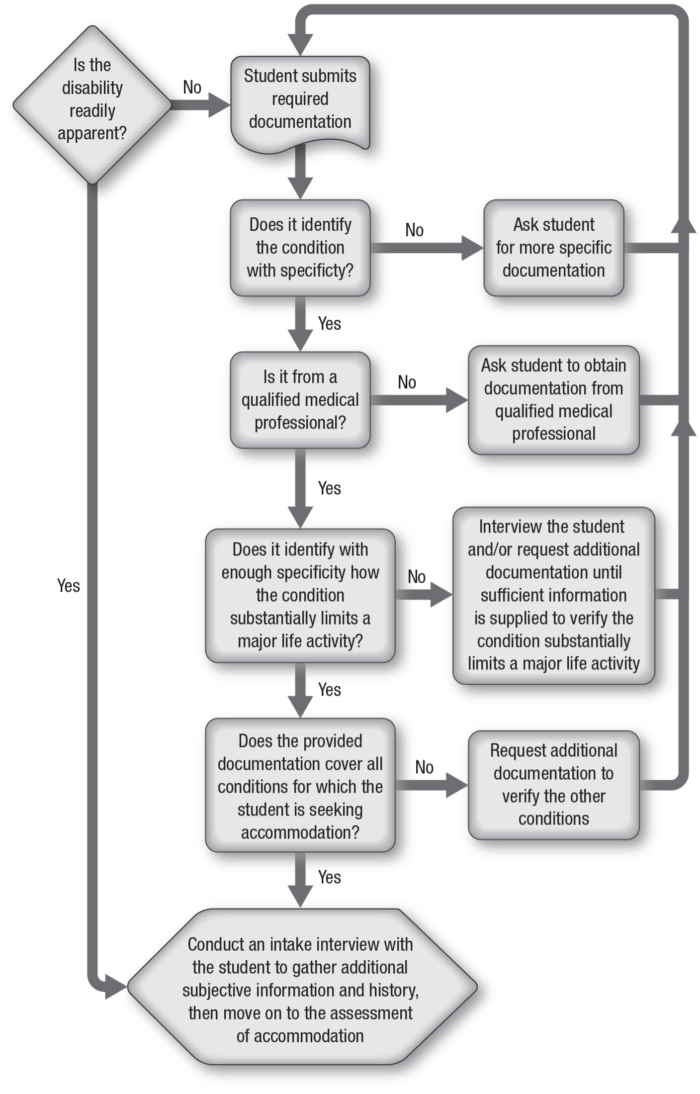Students with Disabilities
The Academic Support Center is committed to providing students with disabilities an equal opportunity to participate in university programs, courses and activities through reasonable accommodations and services. Watch the accommodations process video to learn how to register your disability with the Academic Support Center and hear a student testimonial regarding their experience with receiving accommodations at SAU.
Accommodations Process
1.
Complete online accommodations request form
2.
Send signed information release form to healthcare provider
3.
Healthcare provider sends documentation to Academic Support Center via fax. 833-487-1058
4.
Accommodations Intake Meeting with Director of Academic Support Center manda.kelly@arbor.edu
Required Documentation
A diagnostic statement identifying the disability
Quality documentation includes a clear diagnostic statement that describes how the condition was diagnosed, provides information about the disability’s impact on the individual’s functionality, and describes the typical progression or prognosis of the condition.
The credentials of the evaluator(s)
The best quality documentation is provided by a licensed or otherwise properly credentialed professional who has undergone appropriate and comprehensive training, has relevant experience, and has no personal relationship with the individual being evaluated. A good match between the credentials of the individual making the diagnosis and the condition being reported is expected (e.g., an orthopedic limitation might be documented by a physician, but not a licensed psychologist).
A description of the diagnostic methodology used
Quality documentation includes a description of the diagnostic criteria, evaluation methods, procedures, tests and dates of administration, as well as a clinical narrative, observation, and specific results. Where appropriate to the nature of the disability, having both summary data and specific test scores (with the norming population identified) within the report is recommended.
A description of the current functional limitations
Information on how the disabling condition(s) currently impacts the individual provides useful
information for both establishing a disability and identifying possible accommodations. A combination of the results of formal evaluation procedures, clinical narrative, and the individual’s self-report is the most comprehensive approach to fully documenting the impact. The best quality documentation is thorough enough to demonstrate whether and how a major life activity is substantially limited by providing a clear sense of the severity, frequency and pervasiveness of the condition(s).
A description of the expected progression of the disability
It is helpful when documentation provides information on expected changes in the functional impact of the disability within particular contexts and over time. Information on the cyclical or episodic nature of the disability and known or suspected environmental triggers to episodes provides opportunities to anticipate and plan for varying functional impacts. If the condition is not stable, information on interventions (including the individual’s own strategies) for exacerbations and recommended timelines for re-evaluation are most helpful.
A description of current and past accommodations, services and/or medications
The most comprehensive documentation will include a description of both current and past medications, auxiliary aids, assistive devices, support services and accommodations, including their effectiveness in lessening the functional impacts of the disability. A discussion of any significant side effects from current medications or services that may impact physical, perceptual, behavioral or cognitive performance is helpful when included in the report.
Medical Documentation Review Process
If the disability is readily apparent to, the student will not need to submit additional medical documentation and will meet with the Director of the Academic Support Center for the accommodation intake meeting. If the disability is not readily apparent, the student must submit required medical documentation from a qualified medical professional. The medical documentation must identify with enough specificity how the condition significantly impacts a major life activity.

Web Disability Resources
General Disability Websites
- Association on Higher Education and Disability Organization
- Attention Deficit Disorder Association (ADDA)
- Children and Adults with Attention-Deficit / Hyperactivity Disorder (CHADD)
- Council For Learning Disabilities
- International Dyslexia Association (IDA)
- Learning Disabilities Association of America (LDA)
- LD OnLine
- National Center for Learning Disabilities (NCLD)
- National Coalition of Auditory Processing Disorders
- National Attention Deficit Disorder Association
- State of Michigan Disability Resources site
Multi-Sensory Structured Language Education
- Academic Language Therapy Association
- Academy of Orton-Gillingham Practitioners and Educators
- International Multisensory Structured Language Education Council (IMSLEC)
Accommodations and Technology
- Benetech Bookshare
- CAST (Center for Applied Special Technology)
- Library Reproduction Service (LRS)
- Recording for the Blind and Dyslexic (LearningAlly)
Advocacy and the IEP Process
- Advocates for Justice and Education
- The Council of Parent Attorneys and Advocates
- Disability Rights Education and Defense Fund
- Families and Advocates Partnership for Education (FAPE)
- Parent Advocacy Coalition for Educational Rights (PACER)
- Parent Educational Advocacy Training Center (PEATC)
Social-Emotional
- American Academy of Child and Adolescent Psychiatry
- National Association of School Psychologists (NASP)
- American Speech-Language-Hearing Association (ASHA)
- Association of Educational Therapists (AET)
Higher Education
Research and Reading Disabilities
- Florida Center for Reading and Research (FCRR)
- Vaughn Gross Center for Reading and Language Arts
- What Works Clearinghouse
Resources for Educators
- Council For Exceptional Children (CEC)
- National Center for Education Statistics
- National Association of State Directors of Special Education (NASDSE)
State of Michigan Disability Resources
ASC Personnel
- Consults with students.
- Accepts, evaluates and maintains documentation (consistent with ADA guidelines).
- Establishes reasonable accommodations to reduce academic barriers for students.
- Issues letters of accommodation to students for each of their courses.
American with Disabilities Act
The Academic Support Center is responsible for working with eligible students both on campus and at the various SAU sites in determining the academic accommodations as outlined by the ADA and Section #504 legislation. It is Spring Arbor University’s intention to be non-discriminatory and attempt to remove as many barriers as possible. If a student with proper professional documentation requests accommodations at SAU, he/she will receive a VISA (Verified Individualized Services and Accommodations letter) from the ASC for each of their courses.
Section 504 Grievance Procedure
Read about Spring Arbor University’s Grievance Procedure, in compliance with Section 504 of the Rehabilitation Act of 1973.